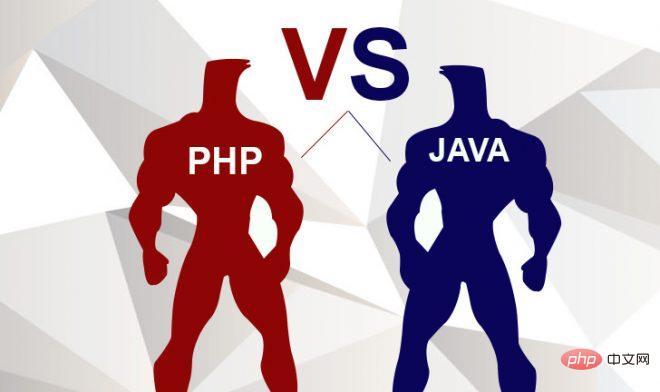 Backend Development
Backend Development
 PHP Tutorial
PHP Tutorial
 Looking back on 2018 and looking forward to the development of PHP in 2019
Looking back on 2018 and looking forward to the development of PHP in 2019
Looking back on 2018 and looking forward to the development of PHP in 2019

Course start notice: php Chinese website "The 10th PHP Online Training Course" is currently being registered!
PHP has a history of more than 20 years since its birth. From the rise of the Web era to the ebb of the mobile Internet, various programming languages and technologies have emerged in the Internet field. Node.js, GO and Python continue to emerge. It is challenging PHP's status. The promoters of these technologies are very keen to badmouth PHP. What is the future of the PHP language? How should PHP programmers cope with future changes?
As a veteran Web back-end programming language, PHP has a very high global market share, second only to Java. From the data of various recruitment websites, it can be seen that there are many positions for PHP development, and the salary level is also very good. In fact, the market position of PHP in small and medium-sized enterprises and Internet startups is higher than that of Java. Java has greater advantages in very large enterprises, traditional software industries, and financial fields. At present, Node.js, GO, Python, Ruby and other languages are still difficult to match PHP and Java.
The reason why the PHP language has achieved today's status is due to the fact that the designers of the PHP language have always followed pragmatism and hidden the technical complexity at the bottom. The PHP language is simple to get started with, easy to master, and the program is robust. It is not prone to complex problems like Java, C and other languages, such as memory leaks and crashes, and tracking and debugging is relatively easy.

The standard library officially provided by PHP is very powerful. Various functions can be found in the official standard library, including MySQL, Memcache, Redis, GD graphics library, and CURL. , XML, JSON, etc., eliminating the trouble of developers looking for libraries everywhere. PHP's documentation is excellent, with detailed descriptions and usage examples for each function. Third-party libraries, tools, codes, and projects are also abundant. Developers can use PHP to write and develop various software quickly and efficiently.
So far, there is still no programming language on the market that is simpler and easier to use than PHP. Therefore, the prospects of PHP are still very broad. Instead of worrying about the choice of programming language, it is better to learn and use PHP in depth.
As a senior PHP developer, I would like to give you some technical suggestions for the future of PHP programs. I hope it will be helpful to everyone.
01 Composer
The first point is to mention Composer. Since the emergence of Composer, PHP dependency management can become very simple. The program relies on some class libraries and frameworks, which can be introduced directly using Composer, and the dependent packages can be installed using composer update. Various difficulties in loading external libraries in the past have been solved.
Composer also has domestic mirrors, which are very fast. Nowadays, most PHP open source projects provide support for Composer. It is recommended that you use Composer to solve the problem of PHP code package management in your project, and do not use the original method of downloading source code and manually including it.
Recommended tutorial: Instance tutorial on using Composer under Windows
02 PHP7
The PHP7 version has made a lot of modifications to the Zend engine, which has greatly improved PHP Language performance, using PHP7 can instantly double the performance of your program. Even heavyweight software like WordPress can achieve thousands of QPS when running on PHP7, which is equivalent to a server that can handle 80 million requests per day.
Use PHP7, optimize MySQL, and use Memcache and Redis for acceleration. This technical architecture can fully cope with quite large-scale systems. Except for some platforms with hundreds of millions of users, systems of average size are completely stress-free.
03 PSR
PSR is a PHP language development specification formulated by the PHPFramework Interop Group. It stipulates many rules, such as namespace, class name specification, coding style standard, Autoload, and public interface. wait. It has now become the de facto standard in the PHP technology community. Many well-known PHP frameworks and libraries comply with the PSR specification.
PHP developers should learn to master the PSR specification and try to follow the PSR specification when developing programs.
04 Swoole
Is PHP still limited to web websites in 2018? No, if you don’t know Swoole yet, go and find out about it. Swoole's slogan is to redefine the PHP language. Swoole is an asynchronous and parallel communication engine that runs as an extension of PHP.
There is an asynchronous callback Swoole in Node.js, and there is also a coroutine Swoole in the Go language, which completely subverts the understanding of PHP. Using Swoole PHP, you can implement a memory-resident server program and realize the programming development of TCP and UDP asynchronous network communication.
In the past, PHP could only build a Web website, but now Swoole can be used to provide communication services that can only be implemented in Java and C, such as WebSocket communication, chat, push server, RPC remote calling service, gateway, proxy, and game server. wait. If you want to use PHP to do something other than web systems, Swoole is the best choice.
05 Laravel
The most popular PHP framework in recent years, the official website claims to be a framework designed for Web artists, which shows how elegant this framework is. Laravel provides rich functional modules, simple API design, and strong expressiveness. Moreover, its community is very active, there are many code contributors, there are many third-party plug-ins, and the ecosystem is quite prosperous.
Laravel uses a lot of symfony2 components at the bottom layer, and realizes dependency management through composer. If you are still wondering which PHP framework to use, it is better to choose Laravel. The command line tool provided by Laravel is based on symfony.console and is powerful. It integrates various project management and automatic code generation functions.
06 Phar
After PHP5.3, a Java-like jar package is supported, named phar. Used to package multiple PHP files into one file. This feature allows PHP to package and componentize applications as easily as Java. An application can be packaged into a Phar package and run directly in PHP-FPM.
With Swoole, you can execute php server.phar on the command line to start the server with one click. PHP code packages can be packaged into components using Phar and placed in Swoole's server container for loading and execution.
The above is the detailed content of Looking back on 2018 and looking forward to the development of PHP in 2019. For more information, please follow other related articles on the PHP Chinese website!

Hot AI Tools

Undresser.AI Undress
AI-powered app for creating realistic nude photos

AI Clothes Remover
Online AI tool for removing clothes from photos.

Undress AI Tool
Undress images for free

Clothoff.io
AI clothes remover

AI Hentai Generator
Generate AI Hentai for free.

Hot Article

Hot Tools

Notepad++7.3.1
Easy-to-use and free code editor

SublimeText3 Chinese version
Chinese version, very easy to use

Zend Studio 13.0.1
Powerful PHP integrated development environment

Dreamweaver CS6
Visual web development tools

SublimeText3 Mac version
God-level code editing software (SublimeText3)

Hot Topics
 1385
1385
 52
52
 PHP 8.4 Installation and Upgrade guide for Ubuntu and Debian
Dec 24, 2024 pm 04:42 PM
PHP 8.4 Installation and Upgrade guide for Ubuntu and Debian
Dec 24, 2024 pm 04:42 PM
PHP 8.4 brings several new features, security improvements, and performance improvements with healthy amounts of feature deprecations and removals. This guide explains how to install PHP 8.4 or upgrade to PHP 8.4 on Ubuntu, Debian, or their derivati
 How To Set Up Visual Studio Code (VS Code) for PHP Development
Dec 20, 2024 am 11:31 AM
How To Set Up Visual Studio Code (VS Code) for PHP Development
Dec 20, 2024 am 11:31 AM
Visual Studio Code, also known as VS Code, is a free source code editor — or integrated development environment (IDE) — available for all major operating systems. With a large collection of extensions for many programming languages, VS Code can be c
 7 PHP Functions I Regret I Didn't Know Before
Nov 13, 2024 am 09:42 AM
7 PHP Functions I Regret I Didn't Know Before
Nov 13, 2024 am 09:42 AM
If you are an experienced PHP developer, you might have the feeling that you’ve been there and done that already.You have developed a significant number of applications, debugged millions of lines of code, and tweaked a bunch of scripts to achieve op
 How do you parse and process HTML/XML in PHP?
Feb 07, 2025 am 11:57 AM
How do you parse and process HTML/XML in PHP?
Feb 07, 2025 am 11:57 AM
This tutorial demonstrates how to efficiently process XML documents using PHP. XML (eXtensible Markup Language) is a versatile text-based markup language designed for both human readability and machine parsing. It's commonly used for data storage an
 Explain JSON Web Tokens (JWT) and their use case in PHP APIs.
Apr 05, 2025 am 12:04 AM
Explain JSON Web Tokens (JWT) and their use case in PHP APIs.
Apr 05, 2025 am 12:04 AM
JWT is an open standard based on JSON, used to securely transmit information between parties, mainly for identity authentication and information exchange. 1. JWT consists of three parts: Header, Payload and Signature. 2. The working principle of JWT includes three steps: generating JWT, verifying JWT and parsing Payload. 3. When using JWT for authentication in PHP, JWT can be generated and verified, and user role and permission information can be included in advanced usage. 4. Common errors include signature verification failure, token expiration, and payload oversized. Debugging skills include using debugging tools and logging. 5. Performance optimization and best practices include using appropriate signature algorithms, setting validity periods reasonably,
 PHP Program to Count Vowels in a String
Feb 07, 2025 pm 12:12 PM
PHP Program to Count Vowels in a String
Feb 07, 2025 pm 12:12 PM
A string is a sequence of characters, including letters, numbers, and symbols. This tutorial will learn how to calculate the number of vowels in a given string in PHP using different methods. The vowels in English are a, e, i, o, u, and they can be uppercase or lowercase. What is a vowel? Vowels are alphabetic characters that represent a specific pronunciation. There are five vowels in English, including uppercase and lowercase: a, e, i, o, u Example 1 Input: String = "Tutorialspoint" Output: 6 explain The vowels in the string "Tutorialspoint" are u, o, i, a, o, i. There are 6 yuan in total
 Explain late static binding in PHP (static::).
Apr 03, 2025 am 12:04 AM
Explain late static binding in PHP (static::).
Apr 03, 2025 am 12:04 AM
Static binding (static::) implements late static binding (LSB) in PHP, allowing calling classes to be referenced in static contexts rather than defining classes. 1) The parsing process is performed at runtime, 2) Look up the call class in the inheritance relationship, 3) It may bring performance overhead.
 What are PHP magic methods (__construct, __destruct, __call, __get, __set, etc.) and provide use cases?
Apr 03, 2025 am 12:03 AM
What are PHP magic methods (__construct, __destruct, __call, __get, __set, etc.) and provide use cases?
Apr 03, 2025 am 12:03 AM
What are the magic methods of PHP? PHP's magic methods include: 1.\_\_construct, used to initialize objects; 2.\_\_destruct, used to clean up resources; 3.\_\_call, handle non-existent method calls; 4.\_\_get, implement dynamic attribute access; 5.\_\_set, implement dynamic attribute settings. These methods are automatically called in certain situations, improving code flexibility and efficiency.



